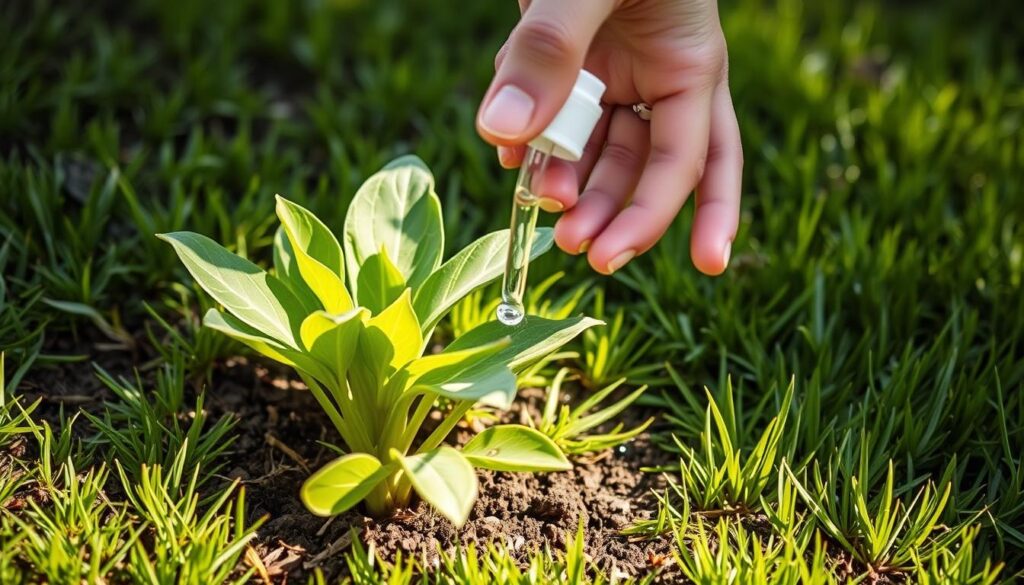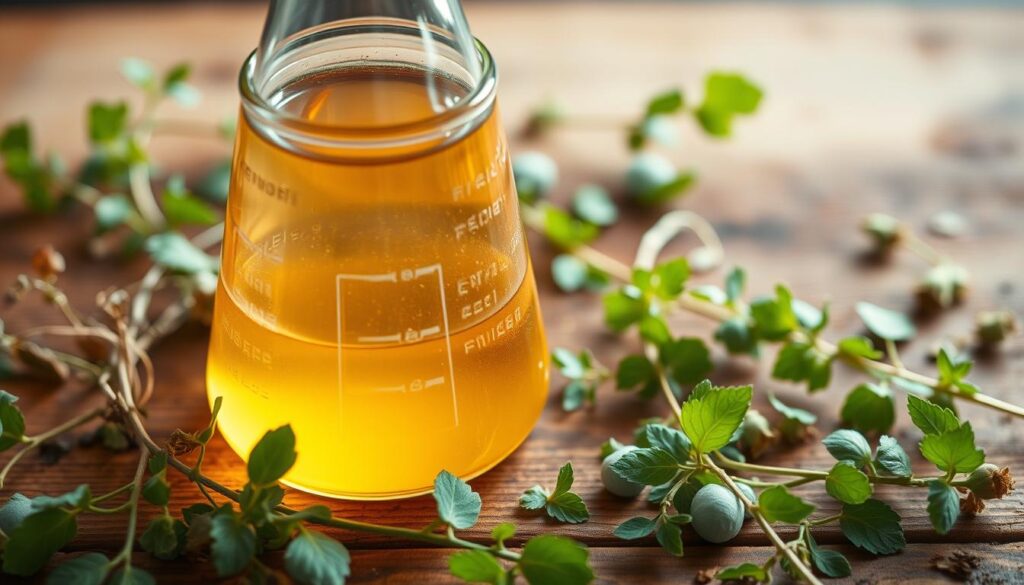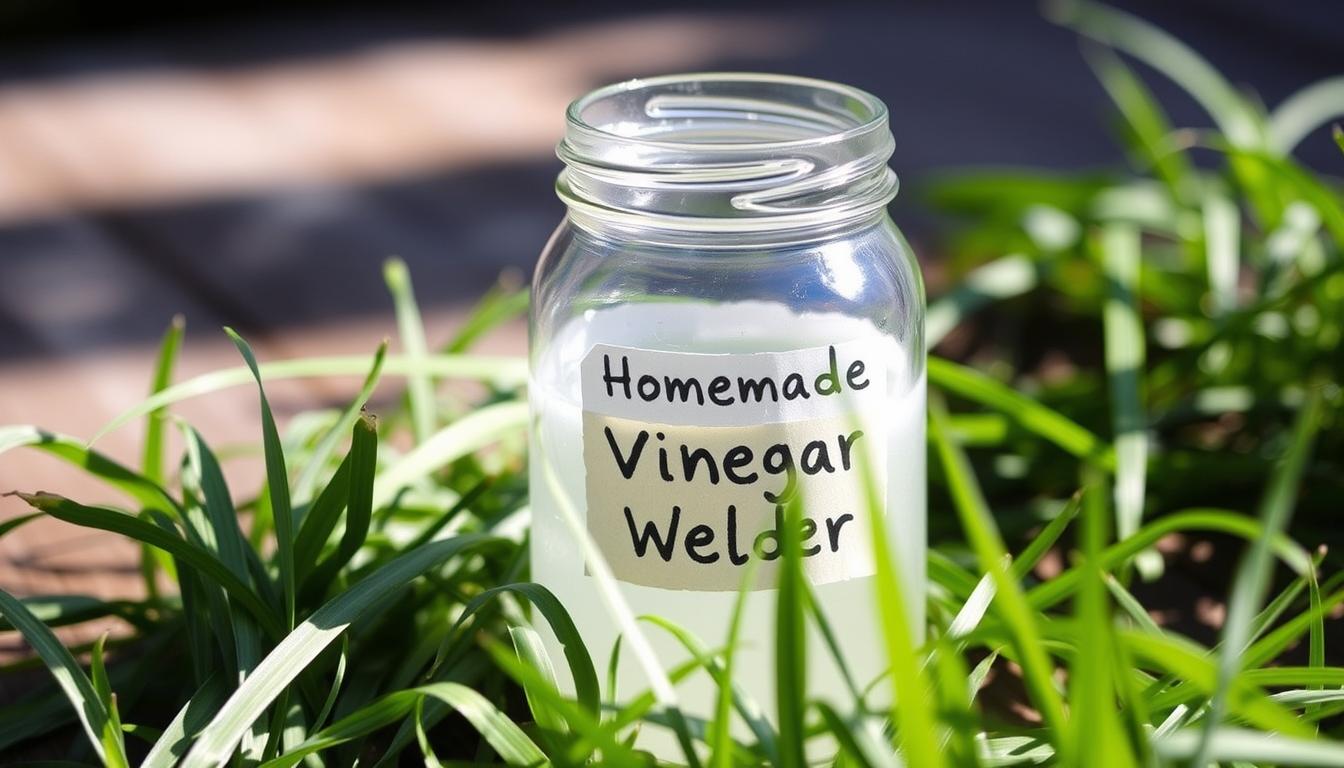Are you tired of using harsh chemicals to control unwanted growth in your garden or yard? You’re not alone. Many homeowners are looking for eco-friendly alternatives to traditional weed control methods.
Making your own homemade vinegar weed killer is a simple and effective solution. This natural approach helps you avoid toxic substances. It also saves you money while keeping your outdoor space looking great.
By using a homemade solution, you can take control of your garden’s health and beauty. You won’t break the bank or harm the environment.
Key Takeaways
- Learn how to make a natural and effective weed killer at home.
- Discover the benefits of using a homemade vinegar solution.
- Understand how to avoid harsh chemicals in your garden or yard.
- Find out how to maintain your outdoor space in a cost-effective way.
- Explore the eco-friendly advantages of a homemade weed killer.
Understanding the Effectiveness of Vinegar as a Weed Killer
Learning how vinegar kills weeds can help you garden better. It’s a natural, effective choice instead of chemical weed killers. More gardeners and homeowners are choosing it for its eco-friendly benefits.
Why Vinegar Works on Weeds
Vinegar’s acidity is what makes it good at killing weeds. The acetic acid in it harms the weed’s leaves and roots. “The acidity level of vinegar is crucial for its weed-killing properties.” Experts say the more acetic acid, the better it kills weeds.
Vinegar kills weeds by messing with their cells. This makes the plants dry out and die. It’s great for young weeds or where you can’t use chemical herbicides.
Different Types of Vinegar and Their Uses
Not all vinegars are the same for weed control. Culinary vinegar has about 5% acidity and isn’t as strong. Horticultural vinegar, with 20% acidity, is better for gardening. It’s made to kill weeds more effectively.
How Vinegar Affects Plants
Vinegar’s acetic acid gets into the weed’s leaves and messes with its cells. This makes the weed lose water and die. But, use vinegar carefully to not harm good plants.
As gardening experts say,
“Vinegar is a valuable tool in the fight against weeds, offering a non-toxic and environmentally friendly alternative to chemical herbicides.”
Vinegar is a top pick for natural weed control. Its effectiveness and eco-friendliness make it popular.
Essential Ingredients for Your Vinegar Weed Killer
To make your own vinegar weed killer, you need a few key ingredients. The quality and type of these ingredients greatly affect how well your homemade weed killer works.
Choosing the Right Vinegar Concentration
The vinegar’s strength is key to its weed-killing power. Household vinegar usually has 4% to 8% acetic acid. For better results, a stronger vinegar is often needed.
Types of Vinegar and Their Acidity Levels:
| Type of Vinegar | Acetic Acid Concentration |
|---|---|
| Household Vinegar | 4% – 6% |
| Horticultural Vinegar | 20% – 30% |
| Industrial Vinegar | 30% or higher |
Horticultural vinegar with 20% acetic acid is best for DIY projects. It’s effective yet safe.
Additional Ingredients for Increased Efficacy
While vinegar is the main ingredient, adding other things can make it better. Salt and dish soap are common additives.
Salt helps dry out weeds, stopping them from coming back. But, use salt carefully to avoid harming the soil.
Dish soap makes the vinegar solution stick to weeds. This boosts its effectiveness.
DIY Vinegar Weed Killer Recipes
Making your own vinegar weed killer is easy and saves money. You can adjust these recipes to fit your needs and likes.
Basic Vinegar Weed Killer Recipe
A simple vinegar weed spray recipe mixes vinegar with water. The vinegar’s acidity kills weeds by breaking down their cells.
To make a basic vinegar weed killer, you need:
- 1 cup of white vinegar
- 1 gallon of water
Just mix the vinegar and water in a spray bottle. Then, spray it right on the weeds.
Enhanced Vinegar Weed Killer Recipe
For a better vinegar weed control solution, add dish soap. The soap makes the solution stick to weeds, making it more effective.
To make an enhanced vinegar weed killer, you need:
- 1 cup of white vinegar
- 1 tablespoon of dish soap
- 1 gallon of water
Mix the ingredients in a spray bottle. Spray it directly on the weeds.
Organic Options for Eco-Friendly Gardening
For an organic choice, use apple cider vinegar instead of white vinegar. It’s a natural and eco-friendly option.
Here’s a comparison of different vinegars for weed control:
| Type of Vinegar | Acidity Level | Effectiveness |
|---|---|---|
| White Vinegar | 5% | High |
| Apple Cider Vinegar | 4-5% | Moderate to High |
| Balsamic Vinegar | 6% | High |
How to Apply Vinegar Weed Killer Effectively
Using vinegar as a weed killer works best when applied correctly. To get the most out of your homemade vinegar weed killer, knowing the right application methods is key.
Best Times to Apply Vinegar
When it comes to natural weed killer with vinegar, timing is crucial. The best time is on a sunny day when weeds are growing. Sunlight makes vinegar more effective by raising the temperature.
Don’t apply vinegar weed killer before rain or when the soil is wet. This can weaken its strength. It’s best to apply during dry spells to ensure it works well.
Methods of Application
There are different ways to apply vinegar weed killer. The method you choose depends on the area and the weeds you’re fighting.
- Spray Bottle: For small spots, a spray bottle is perfect. It lets you target weeds precisely.
- Backpack Sprayer: For bigger areas, a backpack sprayer is better. It saves time by covering more ground without needing to refill.
Whichever method you pick, make sure to spray the vinegar directly on the weeds. Avoid spraying too much, as it can harm nearby plants and soil.
Safety Precautions When Using Vinegar
Vinegar is generally safe but can be risky when used as a weed killer in strong forms.
“When handling vinegar, especially in concentrations higher than household vinegar, it’s essential to wear protective gear, including gloves, goggles, and a mask. Vinegar’s acidity can cause skin and eye irritation and respiratory issues if inhaled.”
To safely use homemade vinegar weed killer, take these precautions:
- Wear protective clothing to prevent skin contact.
- Avoid spraying on windy days to prevent drift onto desired plants.
- Keep children and pets away from treated areas until the vinegar has dried.
By following these tips, you can use vinegar as a natural and effective weed killer in your garden.
Areas Where You Should Not Use Vinegar Weed Killer
Before using vinegar weed killer, it’s important to know where not to use it. This DIY solution works well for getting rid of weeds. But, it can cause problems in some situations.
Protecting Desired Plants
One big worry with vinegar weed killer is harming your wanted plants. Vinegar kills any plant it touches, not just weeds. So, you must be careful not to spray it on flowers, shrubs, or trees.
To avoid problems, take these steps:
- Only spray vinegar weed killer on weeds, not on plants you want to keep.
- Use a shield or barrier to protect plants if it’s windy.
- Apply the solution on a calm day to stop it from drifting.
Avoiding Soil Damage
Vinegar can change the soil’s pH, which might harm good bacteria and soil health. This effect is usually short-term. But, using it too often can cause lasting damage.
To prevent soil damage, follow these tips:
- Check your soil pH before and after using vinegar weed killer.
- Don’t use vinegar weed killer in areas with sensitive or weak soil.
- Look for other ways to control weeds in these areas.
Alternatives for Sensitive Areas
If vinegar weed killer isn’t right for your area, there are other options. You can try manual weeding, using mulch, or other non-toxic weed products.
Some good alternatives are:
- Manual removal: Pulling or digging up weeds by hand.
- Boiling water: Pouring hot water on weeds to kill them without chemicals.
- Flame weeding: Using a propane torch to kill weeds with heat.
Frequency of Application for Best Results
To get rid of weeds well, knowing when to use your vinegar weed killer is crucial. How often you apply it depends on the weeds you’re fighting and the vinegar solution’s strength.
When to Reapply Vinegar Weed Killer
Reapply vinegar weed killer recipe every 7 to 10 days, based on the weed’s reaction to the first treatment. For tougher weeds, you might need to do it more often.
Weather also plays a part; rain can weaken the solution, so you might need to apply it again sooner.
Signs You Need to Reapply
Watch for signs that it’s time to reapply, like weeds growing back or staying. If weeds don’t die as they should, you might need to use more organic weed killer vinegar or apply it more often.
Here are some signs you should reapply:
- Weeds growing back
- New weeds showing up in treated spots
- Weeds not dying as they should
For better planning, check out this table for a general guide on when to reapply based on weed type:
| Weed Type | Initial Kill Rate | Reapplication Interval |
|---|---|---|
| Annual Weeds | High | 7-10 days |
| Perennial Weeds | Moderate | 5-7 days |
| Resistant Weeds | Low | 3-5 days |

By watching how weeds react to the vinegar weed killer and adjusting your timing, you can get the best results in fighting weeds.
Comparing Vinegar Weed Killers to Commercial Options
Homemade vinegar weed killers and commercial products have their own strengths and weaknesses. When choosing, think about cost, how well they work, and their impact on the environment.
Cost Analysis: Homemade vs. Store-Bought
Using homemade vinegar weed killer saves money. Vinegar is something you might already have at home. Mixing it with other natural items can make a strong weed killer without spending a lot.
| Product | Cost per Use | Quantity |
|---|---|---|
| Homemade Vinegar Weed Killer | $0.50 | 1 gallon |
| Commercial Weed Killer A | $2.00 | 1 quart |
| Commercial Weed Killer B | $3.50 | 1 quart |
The table shows homemade vinegar weed killer is much cheaper than commercial ones. This makes it a good choice for those watching their budget or dealing with big areas.
Effectiveness: A Side-by-Side Comparison
Effectiveness is key when choosing a weed killer. Commercial products can kill weeds fast but might harm other plants and the environment. Homemade vinegar weed killers can be just as effective, especially if used right and in the right amount.
Key Considerations:
- Concentration of vinegar
- Addition of surfactants or other ingredients
- Method and frequency of application
Environmental Impact Considerations
The impact of weed killers on the environment is a big worry. Commercial herbicides can pollute soil and water, hurting wildlife and ecosystems. Homemade vinegar weed killers, made from natural stuff, are better for the planet because they break down fast.
Eco-friendly benefits of homemade vinegar weed killers include:
- Reduced chemical runoff
- Less harm to beneficial insects and microorganisms
- Biodegradable ingredients
Potential Risks of Using Vinegar as a Weed Killer
Vinegar weed killer is a popular DIY choice. But, it’s important to know its risks for safe use. Vinegar is natural and non-toxic, but its acidity can be harmful if not used right.
Understanding Vinegar’s Acidity
Vinegar’s acidity makes it effective against weeds. The acetic acid in vinegar can damage or kill weeds by messing with their cells. But, this acidity can also harm other plants and surfaces.
Using vinegar with more than 15% acetic acid can damage good plants and soil. It’s key to pick the right vinegar concentration for your needs. A mix of 5% to 10% acetic acid is usually best for weed control. Handling vinegar can irritate skin and eyes, so be careful.

Health Risks and Precautions
There are health risks to watch out for when using vinegar as a weed killer. Direct contact can irritate skin, and breathing in the spray can cause breathing problems. Wear protective clothes like gloves, long sleeves, and goggles to avoid these issues.
Some important health precautions include:
- Wearing protective gear to prevent skin contact and inhalation
- Avoiding application on windy days to prevent drift onto desirable plants or skin
- Keeping children and pets away from treated areas until the vinegar has dried
- Following the recommended dilution ratios to avoid using overly concentrated solutions
Weeds That May Resist Vinegar
While vinegar works well on many weeds, some may not be as affected. Weeds with deep roots or those that are very strong might need more treatments or other methods.
Some weeds that vinegar may not work on include:
- Dandelions, due to their deep taproots
- Bermuda grass, which can regrow from remaining roots
- Certain perennial weeds that have extensive root systems
For these tough weeds, you might need to try other methods. This could be manual removal or using vinegar with other natural weed killers.
Conclusion: Making an Informed Choice for Lawn Care
Using a DIY vinegar weed killer is a smart and green way to fight weeds in your lawn. Knowing the good and bad helps you decide if it’s right for your garden.
Benefits of Vinegar Weed Killer
Vinegar weed killer is a safe and natural choice. It’s better for the planet than chemical weed killers. Plus, it’s cheap and simple to make at home.
Experimenting with Your Own Recipes
Now you know the basics of DIY vinegar weed killer. You can try different recipes to see what works best for your lawn. You might want to change how much vinegar you use or add other natural stuff to make it stronger.
Choosing organic solutions like vinegar weed killer helps the environment and keeps your family and pets safe. Start making your own gardening products today.
FAQ
What is the ideal concentration of vinegar for a homemade weed killer?
For a homemade weed killer, use vinegar with 5-20% acetic acid. This mix is effective but also safe for plants.
Can I use any type of vinegar for weed control?
Yes, but white vinegar or horticultural vinegar work best. They have high acetic acid levels.
How often should I reapply vinegar weed killer?
Reapply every few days to a week, depending on the weeds. The first treatment’s success matters.
Is vinegar weed killer safe to use around pets and children?
Vinegar is mostly safe, but it can still be harmful. Keep it away from pets and kids to avoid accidents.
Can I mix vinegar with other household ingredients to enhance its weed-killing properties?
Mixing vinegar with salt or dish soap might help. But be careful not to harm plants or the environment.
What are some alternatives to vinegar weed killer for sensitive areas?
For sensitive spots, try manual weeding, mulching, or flame weeding. These methods are safer and more precise.
How does the cost of homemade vinegar weed killer compare to commercial products?
Homemade vinegar weed killer is much cheaper than store-bought options. The cost depends on the ingredients and their amounts.
Can vinegar weed killer be used on all types of weeds?
Vinegar works on many weeds, but some may resist. For tough weeds, you might need to try again or use something else.
What are the environmental implications of using vinegar weed killer?
Vinegar weed killer is better for the environment than many chemicals. It breaks down easily and is safe. But, using too much can still harm plants and soil.
How can I minimize the risk of damage to desirable plants when using vinegar weed killer?
Target your spray carefully and avoid windy days. Use a shield to protect plants you don’t want to harm.

